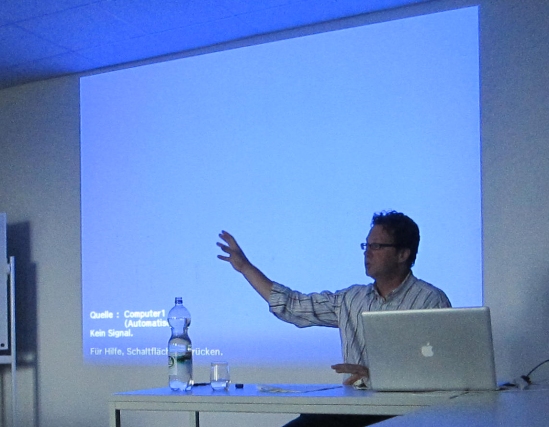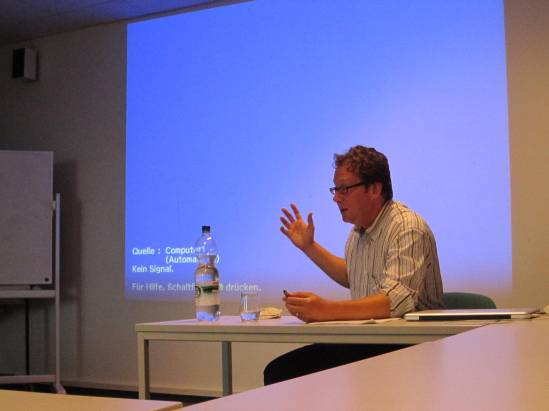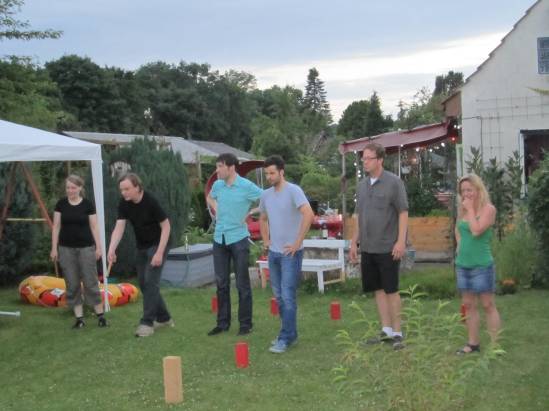Here are a few images from Mark Hansen’s talks on July 2 and 3.
The first two were taken Monday, at a very inspiring talk called “Feed-Forward, or the ‘Future’ of 21st Century Media.”
Above, a picture taken Tuesday, at the talk given in the context of my media theory seminar: “The End of Pharmacology?: Historicizing 21st Century Media.”
And a picture taken over the weekend, during an exciting game of “Vikinger-Schach”!
Finally, here is the text of my introduction to the Monday night talk:
First of all, I’d like to say that I am very honored, and I am very happy, to introduce Mark Hansen to you today. Mark is Professor in the Literature Program at Duke University, where he is also affiliated with a range of departments, programs, and interdisciplinary centers, including the department of Art, Art History, and Visual Studies, the Program in the Arts of the Moving Image, the Visual Studies Initiative, and the Program in Information Science + Information Studies. Before going to Duke in 2008, Mark served as Professor of English, Visual Arts, and Cinema and Media Studies at the University of Chicago, prior to which he held positions in the English Department at Princeton. Over the past decade or so, he has established himself as one of the leading media theorists in America and the world, a reputation built on a steady stream of equally demanding and rewarding publications, including three monographs to date. His book Embodying Technesis: Technology Beyond Writing, which was published in 2000, set the stage for much of his subsequent work by arguing for a robustly material conception of technologies and their relations to and impacts on experiencing bodies. Identifying the ways that many of the master thinkers of twentieth century high theory, including Freud, Heidegger, Derrida, Deleuze and Guattari, had struggled with but ultimately perpetuated a reduction of the technical to the narrow frames of discourse and subjective thought, thus obscuring technology’s more diffuse impacts and its role as infrastructure for thought and experience, the book cleared the ground for a more positive engagement with changes in this infrastructure, especially as occasioned by the advent of computational media. Thus, New Philosophy for New Media, published in 2004, undertook a careful analysis of the digital image, which was shown with the help of resources updated from Henri Bergson to be far less fixed and visually concentrated than one might assume; instead, digital images turned out to be highly processual and dispersed across a network of materially embodied agents — processors, flickering pixels, and above all human bodies that filter and select the relevant forms, providing the very frame for computationally generated images. Mark’s next book, Bodies in Code: Interfaces with New Media, from 2006, continued this focus on our affective engagement with the world, and on the modulation of that engagement through media that articulate an ongoing coevolution of humans and technics. Mark has also co-edited several important volumes, including The Cambridge Companion to Merleau-Ponty (co-edited with Taylor Carman), Emergence and Embodiment: New Essays on Second-Order Systems Theory (with Bruce Clarke), and Critical Terms for Media Studies (with William J. T. Mitchell). He is currently wrapping up a book project entitled Feed-Forward: The “Future” of 21st Century Media, and this, I presume, is the basis of what he’ll be talking about today.
So, conventionally, this is where I would say “and now, without further ado,” but in fact I do want to subject you to just a little bit more “ado.” If the list of professorships, books, and ideas that I’ve been recounting here can be said to constitute an official “text” of Mark Hansen’s career as a world-class media theorist, there’s also a little-known subtext, or perhaps paratext, through which he has been connected with Hannover and exerted here a subtle but definite influence over the years. Most recently, I have had my students reading his thoughts on “New Media” this semester, while our Film & TV Reading Group also met to discuss an important article called, simply, “Media Theory.” These are texts that have been very important to me personally, and they played a key role in challenging me to articulate some of the foundational ideas in my dissertation. As some of you may know, Mark served as the second examiner for that project, and some of the people here today were also present at my thesis defense in December 2010, when Mark joined us, quite fittingly, as a digital image, by way of video-conferencing technology. But the intellectual and personal connections with Hannover run deeper and are older than that. What many people don’t know is that this is Mark’s second — real-life, corporeal — visit to the English Department at the University of Hannover. The first one was exactly 15 years ago, in the summer of 1997. Few people know this, because it was before most of the current faculty, staff, and students had ever set foot in this building. Well, not to brag or anything, but: I was there. In fact, it was my very first trip to Germany, an exchange trip headed by Mark, who in those almost prehistoric days — prior to Duke, Chicago, and Princeton — was employed at a place called Southwest Texas State University (which, incidentally, is a name that has since lost its power of designation, as that university is now called something else). Anyway, it was there, and here (back then), that Mark planted many of the seeds that would come to fruition much later in my own work, and that have quietly informed my teaching practice here for over a decade. I am grateful, then, to the Fulbright Program and to our university’s Gastwissenschaftler-Programm for making it possible to bring Mark back once again after all these years. Above all, though, and this is what I’ve been trying to get at with this excavation of a “Hannover connection,” I wish to express my gratitude to Mark both as a mentor and as a friend. Thank you. And now, I am very proud to present to you Mark Hansen.



